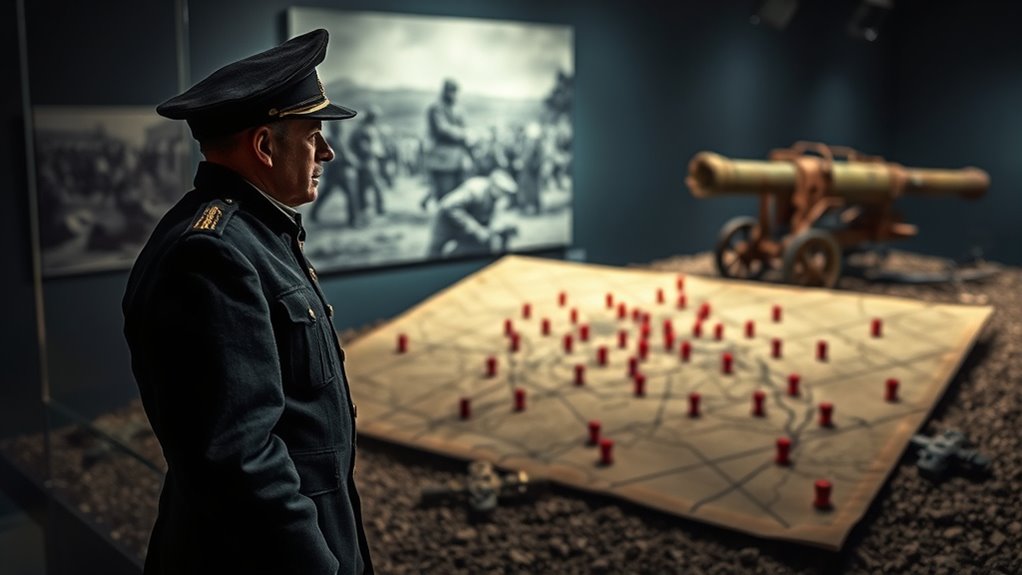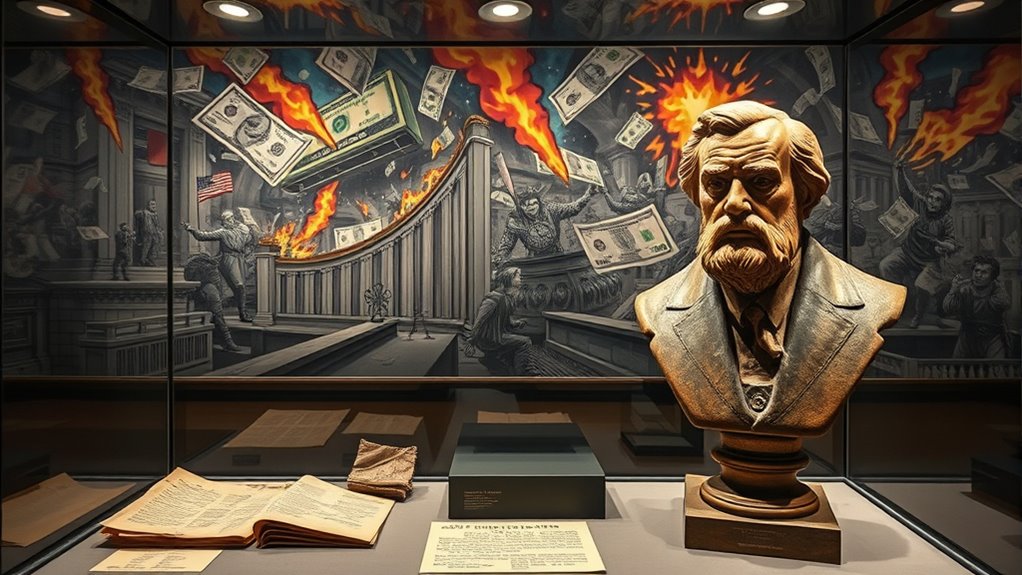By examining the mistakes of historical figures, you can learn how political blunders, missed business opportunities, scientific errors, military decisions, economic crises, and cultural oversights shape outcomes. These lessons show you the importance of strategic thinking, adaptability, transparency, regulation, and inclusivity. Recognizing these errors helps you avoid similar pitfalls in your own decisions. If you stay curious, you’ll uncover even more crucial lessons to guide your actions wisely in the future.
Key Takeaways
- Analyzing strategic errors of leaders like Neville Chamberlain or Napoleon highlights the importance of foresight and adaptability.
- Recognizing political and military mistakes teaches the value of accurate intelligence and timely decision-making.
- Studying business oversights, such as Kodak’s digital suppression, underscores the need for innovation and market awareness.
- Learning from healthcare errors emphasizes vigilance, transparency, and continuous improvement to prevent irreversible harm.
- Reflecting on economic crises reveals how regulation and systemic oversight can prevent widespread failures.
Political Blunders That Changed History

Political blunders have often had profound and lasting effects on history, shaping nations and altering the course of events. Take Gerald Ford’s 1976 claim that there was no Soviet domination of Eastern Europe; this mistake hurt his credibility and helped Jimmy Carter win that year’s election. A lack of understanding of digital literacy in modern politics can lead to miscommunications and missteps that impact public trust. Similarly, Neville Chamberlain’s policy of appeasement toward Nazi Germany emboldened Hitler, leading to World War II. Charles I’s imposition of “Ship Money” without parliamentary approval fueled unrest and set the stage for the English Civil War. Richard Nixon’s decision to record Oval Office conversations backfired when those tapes revealed his involvement in Watergate, ultimately forcing his resignation. These errors demonstrate how a single misjudgment or misstatement can have ripple effects, changing political trajectories and shaping history’s course. Sometimes, a failure to recognize ethical implications can lead to disastrous consequences that echo through generations. Recognizing the importance of historical context is crucial to avoid repeating such mistakes in decision-making processes. Additionally, a lack of awareness about consequences of misinformation has increasingly become a critical factor in modern political errors. Furthermore, neglecting financial considerations during critical decisions can exacerbate political crises and undermine stability.
Missed Opportunities in Business and Investment

Throughout history, many businesses and investors have missed key opportunities simply because they failed to recognize or act on emerging trends. Kodak invented the first digital camera but suppressed it, fearing it would cannibalize film sales.
Missing emerging trends can cost businesses dearly, as seen with Kodak’s suppressed digital innovation.
Blockbuster declined to acquire Netflix, missing the streaming revolution. The Waumbec Textile Company failed to adapt to market changes, and many banks overlooked digital transformation, falling behind competitors.
The AOL-Time Warner merger faltered due to an inability to adapt to changing markets, while Northern Rock’s failure stemmed from ignoring financial shifts. Investors also missed the tech boom, suffering losses, and early skeptics of blockchain missed major opportunities.
These examples show that not recognizing innovations or trends can cost companies and investors dearly, emphasizing the importance of agility and foresight. Recognizing the significance of technological innovations, such as high refresh rates and digital capabilities, is crucial for staying ahead in competitive markets. Being aware of market trends and technological advancements can make the difference between leading and lagging behind in business. Failing to adapt to industry shifts can result in missed growth prospects and loss of market share. Additionally, understanding emerging technologies is essential for maintaining a competitive edge and avoiding obsolescence.
Scientific and Medical Errors With Lasting Impact

Medical errors have become a significant concern in healthcare, with their consequences lasting long after the initial incident. Every year, between 44,000 and 98,000 deaths in US hospitals are attributed to errors, comparable to a jumbo jet crashing every day and a half.
These mistakes can cause irreversible physical damage, chronic health issues, and require multiple surgeries, severely affecting your quality of life. Understanding personal finance management can help patients plan for unexpected medical expenses and safeguard their financial stability.
Emotionally, patients often face trauma, loss of trust, and mental health struggles like depression or PTSD.
Socially, some become more proactive, while others avoid healthcare altogether.
Financially, medical errors lead to increased expenses, lost income, and legal costs.
Recognizing these lasting impacts underscores the importance of vigilance, transparency, and continuous improvement in healthcare systems.
Military Decisions That Altered Outcomes

Military history shows that last-minute decisions and strategic miscalculations can dramatically change the outcome of conflicts. You see this in events like the Battle of Midway, where quick adjustments by the Allies tipped the scales in their favor, and the invasion of Normandy, where timing catches German defenses off guard, ensuring success.
Conversely, misjudgments like Napoleon’s failed Russian campaign or Hitler’s Operation Barbarossa resulted in devastating losses. Tactical blunders, such as the Charge of the Light Brigade, led to heavy casualties due to poor planning. Recognizing these moments highlights how strategic flexibility is crucial, as rigid plans can lead to disaster.
These decisions highlight how flexibility, precise timing, and accurate intelligence are essential. Recognizing these moments emphasizes that even small strategic choices can have monumental effects, shaping the course of history and lessons for future military endeavors. Educational and skill-building toys can also serve as tools to develop critical thinking and strategic planning skills from an early age, illustrating the importance of thoughtful decision-making.
Additionally, understanding the role of appliance maintenance plans can remind us that regular checks and preventive measures are key to avoiding costly failures—whether in machinery or military strategies. In the same way, paying attention to essential oils for strategic health can serve as a reminder that holistic approaches are vital for overall resilience and success.
Economic Mistakes That Led to Crises

History shows that poor economic decisions can have far-reaching and devastating effects, much like strategic errors in warfare. You’ve seen how the Great Depression worsened due to stock market crashes and banking failures, worsened by misguided policies.
The Credit Crisis of 1772, starting in London, spread globally, revealing vulnerabilities in financial systems. The 1973 OPEC oil shock caused stagflation, combining inflation with stagnation. The Asian Financial Crisis in 1997 exposed weaknesses in rapidly growing economies’ financial systems.
Likewise, the Panic of 1907 demonstrated how bank failures can trigger broader instability. Mistakes like raising interest rates during downturns, ignoring warning signs, and deregulation fueled these crises. Overconfidence and speculation, such as the 1929 stock market crash, further amplified economic collapses.
Interconnected global markets meant shocks quickly spread, deepening crises worldwide. AI content clustering techniques can help identify and address early warning signs in economic data, potentially preventing future crises. Additionally, the cybersecurity vulnerabilities experienced during events like the Microsoft outage underscore the importance of robust digital infrastructure in maintaining economic stability. Recognizing the importance of financial regulation is crucial to prevent similar failures in the future. Moreover, the failure to implement effective regulatory oversight has historically led to systemic issues that exacerbate economic downturns.
Furthermore, understanding the legal aspects of separation can be vital in avoiding unintended financial repercussions during economic downturns.
Social and Cultural Oversights Shaping Society

Social and cultural oversights have profoundly shaped societies, often leaving marginalized groups and diverse perspectives sidelined. You mightn’t realize how systemic injustices, like slavery and colonialism, have created lasting disparities. Figures such as Frederick Douglass highlighted society’s moral failures, pushing for civil rights, yet many overlooked the needs of all, as seen in Gandhi’s neglect of untouchables. Recognizing the impact of inefficient systems can help address these historical shortcomings. Cultural oversights, like the internment of Japanese Americans, reveal how fear can override civil liberties. Gender biases suppressed women’s contributions, and suffrage efforts faced resistance. Colonial powers imposed Western culture, erasing indigenous identities and fostering stereotypes. Misguided policies, like Prohibition or urban planning decisions, ignored community needs, causing harm. Learning from these oversights helps you understand the importance of inclusive, culturally aware policies today. Additionally, understanding the social injustices of the past encourages ongoing efforts to promote equity and fairness in contemporary society. Developing cultural intelligence can support current initiatives to foster inclusivity and address lingering disparities.
Frequently Asked Questions
How Can Leaders Effectively Learn From Past Political Mistakes?
You can learn effectively from past political mistakes by openly acknowledging errors and reflecting on their causes. Seek diverse perspectives and advice to avoid narrow thinking.
Take responsibility for your decisions and be transparent about lessons learned. Avoid rushing into new actions without analyzing previous outcomes.
Embrace a culture of accountability, which encourages continuous growth. By doing so, you’ll build credibility, make better decisions, and prevent repeating past errors.
What Strategies Prevent Business Opportunities From Being Overlooked Again?
You face a challenge bigger than Everest—missed opportunities can cripple your success if you’re not careful.
To prevent this, set clear goals, automate workflows, and analyze lost sales for insights.
Leverage CRM systems for timely follow-ups, segment leads to prioritize high-potential prospects, and revisit past opportunities after addressing concerns.
Stay alert to market trends, continually improve processes, and build resilience to turn missed chances into future wins.
How Do Scientific Errors Influence Current Medical Safety Protocols?
You see that scientific errors shape current medical safety protocols by highlighting what went wrong and prompting improvements.
You’ll notice that rigorous testing, systematic approaches, and stricter regulations are now standard practices.
Checklists, staff training, and technology help prevent mistakes.
What Lessons Do Military Blunders Teach About Strategic Planning?
When you study military blunders, you learn the importance of thorough planning, effective execution, and understanding your environment.
Avoid overconfidence, and guarantee your strategies are adaptable to changing circumstances.
Foster collaboration among your team, assess risks honestly, and set clear, realistic goals.
Recognizing political, social, and cultural factors helps prevent failure.
These lessons guide you to develop resilient, well-informed strategies that minimize mistakes and improve success chances.
How Can Societies Address Long-Term Cultural Mistakes?
Imagine a garden neglected for years, weeds taking over, and the soil losing its richness. That’s how long-term cultural mistakes can grow if left unaddressed.
To fix this, you need ongoing cultural education, open dialogue, and policy changes that reflect lessons learned.
Regular reflection on past errors helps prevent future issues.
Just like tending a garden, continuous effort is essential to nurture understanding and foster harmony in society.
Conclusion
Just like Napoleon’s miscalculation at Waterloo, one mistake can ripple through history, transforming societies and shaping futures. By studying these errors, you can avoid repeating them and make wiser decisions. Remember, even the greatest minds stumble—what matters is learning and growing from those missteps. So, keep your eyes open, stay humble, and use the lessons of the past as your guide to a smarter tomorrow.









